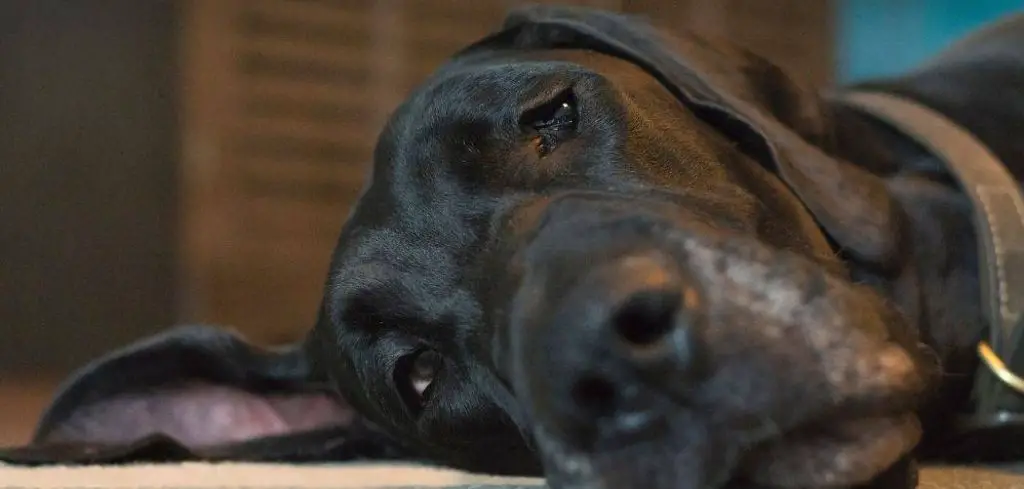When a dog has diarrhea accompanied by white mucus in their stool, it can be alarming and confusing for pet owners.
This combination often points to irritation or inflammation in the digestive tract, and while sometimes mild, it can also be a sign of more serious conditions that need prompt attention.
We outline the possible causes of white mucus in a dog’s poop and diarrhea, what you can do at home, and when to seek veterinary help.
White Mucus in Dog Poop and Diarrhea — Why It Happens
White mucus in dog poop with diarrhea usually indicates that the intestines are inflamed or irritated. The mucus is the body’s way of protecting and lubricating the colon, but when paired with diarrhea, it often signals infection, parasites, dietary intolerance, or even more severe conditions like inflammatory bowel disease or intestinal blockages.
Dogs may also experience fatigue, dehydration, or abdominal pain, depending on the underlying issue. This symptom should not be ignored because it can worsen quickly without proper care.

White Mucus in Dog Poop and Diarrhea: Common Causes
Intestinal Parasites
Parasites such as whipworms, roundworms, and giardia are common culprits of white mucus in stool with diarrhea.
They irritate the lining of the intestines, causing excess mucus production as the body tries to protect itself.
Dogs with parasite-related diarrhea may also show signs like weight loss, bloating, scooting, or poor coat quality. Left untreated, infestations can lead to anemia, malnutrition, and chronic digestive upset.
Read more: Yellow Mucus in Dog Poop and Throwing Up (What it means)
Dietary Indiscretion
Many dogs eat things they shouldn’t—table scraps, garbage, or sudden new foods. When a dog’s digestive system is overwhelmed, the intestines produce excess mucus as a protective response.
This often results in soft stools or diarrhea covered in slimy white mucus. While mild cases may resolve, persistent diarrhea can quickly dehydrate a dog and should be monitored closely.
Bacterial or Viral Infections
Infections like salmonella, campylobacter, or parvovirus can cause severe diarrhea with mucus. The intestines become inflamed, producing extra mucus along with watery, sometimes bloody stools.
These infections often make dogs very sick, with symptoms like fever, vomiting, and lethargy. Puppies and older dogs are especially at risk because their immune systems are more vulnerable.
Inflammatory Bowel Disease (IBD)
IBD is a chronic condition where a dog’s intestines are persistently inflamed, leading to diarrhea mixed with mucus. This inflammation interferes with nutrient absorption and can cause ongoing digestive distress.
Dogs with IBD may also lose weight, become lethargic, or have frequent bouts of loose stool. It is a lifelong condition but can be managed with diet changes and medication under veterinary care.
Food Allergies or Sensitivities
Some dogs develop food allergies or intolerances, which cause the intestines to overproduce mucus along with diarrhea. Common triggers include proteins like chicken or beef, as well as grains or dairy.
These dogs may also experience itching, ear infections, or skin problems in addition to gastrointestinal upset. Identifying and removing the offending ingredient is key to long-term relief.
Stress and Anxiety
Stressful situations such as moving, boarding, or loud environments can upset a dog’s digestive system. Stress-induced colitis often shows up as diarrhea with mucus.
Although usually temporary, it can become recurrent if the underlying stress isn’t addressed. Supportive care and calming strategies often help dogs recover more quickly.
What to Do If Your Dog Has White Mucus in Poop and Diarrhea
If your dog has mild diarrhea with mucus but is otherwise alert, eating, and drinking, you may try supportive care at home.
Offer plenty of fresh water to prevent dehydration and consider feeding a bland diet of boiled chicken and rice for a day or two.
Probiotics formulated for dogs may help restore healthy gut bacteria and reduce inflammation. If dietary indiscretion is the suspected cause, avoid treats, table scraps, and sudden food changes.
Monitor your dog’s stool closely. If diarrhea improves within 24–48 hours, it may have been a minor digestive upset. However, if symptoms persist, worsen, or new signs appear, veterinary care is essential.
When to Call or Visit Your Vet
Call your vet immediately if your dog’s diarrhea with white mucus is accompanied by blood, vomiting, fever, or signs of dehydration such as sunken eyes, dry gums, or lethargy.
Puppies, senior dogs, and those with existing health issues are at higher risk for complications and should see a vet promptly. Persistent diarrhea lasting more than 48 hours always warrants professional evaluation.
Veterinarians may perform fecal tests, bloodwork, or imaging to determine the exact cause.
Early treatment not only helps your dog recover faster but also prevents long-term damage to the digestive system.
Read more: Mucus in Dog Poop and Diarrhea (Why it happens)
Key Takeaway
White mucus in dog poop and diarrhea often signals irritation or inflammation in the digestive tract. While mild cases may improve with supportive care at home, persistent or severe symptoms require veterinary attention.
Watching for changes in your dog’s stool, energy, and hydration status is critical. When in doubt, contacting your vet ensures your dog gets the right treatment and the best chance for a full recovery.
